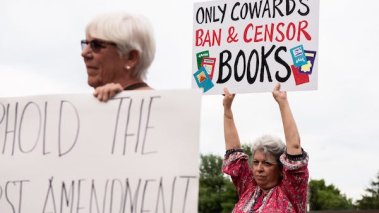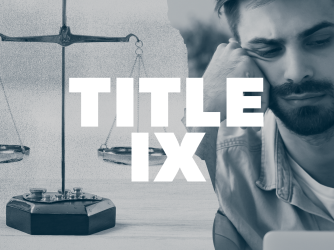Table of Contents
Amid ‘avalanche of censorship,’ federal lawmakers introduce resolution recognizing Banned Books Week

Michele Haddon / Bucks County Courier Times / USA Today Network
Opponents to a proposed library policy in the Central Bucks School District stood outside prior to a school board meeting on Tuesday, July 26, 2022, holding up signs comparing the policy to censorship and book banning.
Yesterday, Rep. Jamie Raskin and Sen. Brian Schatz introduced a resolution recognizing Banned Books Week. The annual awareness campaign, which FIRE is proud to sponsor, is a week-long effort to bring attention to censorship nationwide. The initiative launched 40 years ago “in response to a sudden surge in the number of challenges to books in schools, bookstores, and libraries.”
The resolution could not have come at a more appropriate time, given the sharp increase in attempts to ban books. As recently noted by FIRE Legal Director Will Creeley, “There’s always been some amount of book banning, but this is unprecedented. It is a tsunami — it is an avalanche of censorship.”
In a notable case this summer, a pair of Virginia politicians filed petitions against two books under a rarely used state statute in an attempt to prohibit bookstores from selling either work. FIRE, joined by the Woodhull Freedom Foundation, filed an amicus brief arguing that book bans are antithetical to the First Amendment and the pluralist values it protects. In the end, the court dismissed the petitions to ban the books and found the underlying statute unconstitutional.
The problem is most evident in public school libraries. For instance, in Utah, a school district removed 52 books from school libraries before reversing course due to public outcry. In Virginia, a school board ordered the removal of certain books with LGBTQ themes and called for an audit of school library holdings to eliminate what one member called “bad, evil-related material.” And efforts to ban books are not limited to local school officials — the Oklahoma legislature, for example, introduced a bill that would prohibit school libraries from holding certain books.
In this climate of increased censorship, FIRE welcomes the effort in Congress to reaffirm America’s commitment to core First Amendment protections. To this end, the resolution “reaffirms the commitment of the United States to supporting writers’ freedom of expression, and the freedom of all Americans to read books without government censorship.”
FIRE strongly supports this language given that, while school officials and legislatures have broader discretion to regulate what can be taught in K-12 classrooms than in a university setting, the 1982 Supreme Court case Board of Education, Island Trees Union Free School District No. 26 v. Pico explains that the government cannot remove books from school libraries based purely on political considerations. As Justice Brennan wrote in his plurality opinion, even though school boards “rightly possess significant discretion to determine the content of their school libraries,” he reasoned, “that discretion may not be exercised in a narrowly partisan or political manner.”
Whatever process a school uses to review books held in its libraries, that process must be unbiased and consistent in its application. Importantly, the resolution “calls on local governments and educational institutions to follow outlined best practice guidelines when approaching challenges to books.”
We thank Rep. Raskin and Sen. Schatz for fighting for these important principles.
However, we disagree with certain areas of the resolution, specifically the inclusion of findings related to so-called “curriculum gag orders.” While FIRE strongly opposes book bans, it is important to differentiate between attempts to remove books from libraries and attempts by school officials to decide in-class curriculum.
FIRE has been careful to distinguish between book bans, which erect barriers burdening student access to materials they seek out, and curricular decisions, which are typically delegated to the democratic process of elected officials setting curricular parameters with public input. (This, of course, is not to say that FIRE would necessarily agree with particular decisions reached by those bodies, or even have an institutional view on them.) As we have written, “even if curricular choices are illiberal or unwise, they may well be constitutional.”
Further, school officials have a duty to ensure instructional materials are content or age appropriate for public school curriculums. While reasonable minds can disagree on the exact ages or grade-levels at which students should be introduced to various books in the classroom, a degree of oversight by school boards and legislators with public input is permissible.
Despite these concerns, we are happy to see Congress take steps to recognize Banned Books Week and give a spotlight to the unfortunate increase in book challenges and bans. Burdening students’ ability to access reading materials is antithetical to a culture of free speech.
FIRE will continue to oppose unconstitutional censorship and to engage with legislators to foster a society that values freedom of speech.
Recent Articles
FIRE’s award-winning Newsdesk covers the free speech news you need to stay informed.

FIRE statement on campus violence and arrests

BREAKING: New Title IX regulations undermine campus free speech and due process rights

STATEMENT: Title IX regs mean students less likely to receive justice


